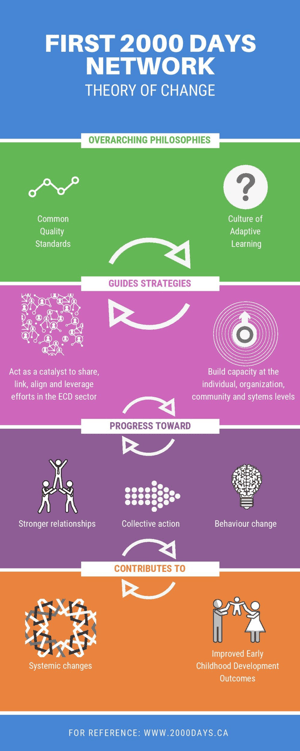 Over the last year, the First 2000 Days Network has been striving to address systems change efforts as part of our multi-tiered Theory of Change and our Systemic Change Framework. Our Network includes what we term ‘change mechanisms’ at multiple levels: individual, community, organization & agency and systems-level – all with the goal of improving outcomes for children and families.
Over the last year, the First 2000 Days Network has been striving to address systems change efforts as part of our multi-tiered Theory of Change and our Systemic Change Framework. Our Network includes what we term ‘change mechanisms’ at multiple levels: individual, community, organization & agency and systems-level – all with the goal of improving outcomes for children and families.
One of the ways to address systems-level change is through policy and advocacy efforts, which has been identified as a value creation activity backbone organizations can bring to collective impact efforts. With a recent election, a link to Calgary’s Poverty Reduction Strategy, our connection to community-level coalitions and some funding to catalyze our efforts, we convened to write a position paper entitled “An Integrated Approach to Early Childhood Development”, designed to outline our policy and advocacy position.
This position paper allowed our Network to articulate the systems change we were collectively seeking. We intentionally focused on the issue of integration at the government level as the ‘highest order principle’ in terms of a systemic change that would impact universal outcomes for children and families. We know that systemic problems are not program or service-specific, they are a function of how institution behave, how structures operate, public perceptions & beliefs and cultural norms. We wanted to address those in our efforts.
The position outlined in our paper is not mutually exclusive to the need to address specific factors such as early learning & child care, maternal mental health, literacy, play - or the many other factors that influence Early Childhood Development outcomes. Rather, it is intended to focus our systems-change ask at the level where we felt change would be systemic, long-term and universal. These changes would be policy & structural changes that would make policymakers more aware of our agenda, and advocate for policy changes that are in line with our collective purpose.
At this stage we are sharing the document and are working on specific strategies to ‘activate’ it in community. We are leveraging the document through existing networks, agency and relationships. Essentially, we want to encourage a mindset that this paper belongs to the community - not the Network – in order to encourage others to use the document to advance conversations around Early Childhood Development.
Given the election is in full swing, we also created a set of cards, each focused on a social issue connected to early childhood development: the economy, mental health, poverty and school readiness. These cards ask the parties & candidates to reflect on simple questions – and provide the research to inform them on the issues. This allows us to ensure community members are increasingly aware of the issue(s) around ECD, can express support for the initiative, feel empowered to engage in the issue(s) and are able to take action.
Best of all, all of this work was done by members of the Network community. People who had talent, passion, knowledge, expertise, time, resources and relationships to leverage - all in the name of improving lives for our children. That is collective impact, that is the First 2000 Days Network!
Learn More:
- Visit the First 2000 Days website for more resources information about their work and impact
- Read the paper An Integrated Approach to Early Childhood Development
- Connect with Blythe by email or LinkedIn
- Learn more about Calgary's Poverty Reduction Strategy
- Read Understanding the Value of Backbone Organizations in Collective Impact from the Stanford Social Innovation Review
- Read Systems Change: A Guide To What It Is And How To Do It





